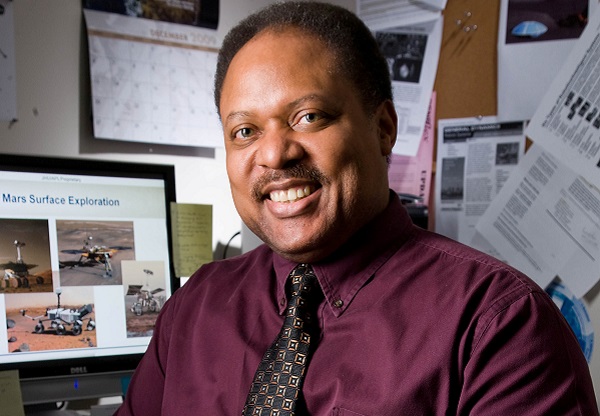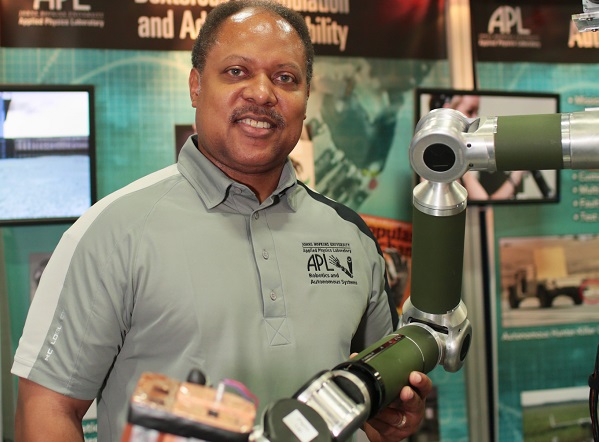
The SMC Newsletter introduces Dr. Edward Tunstel, Senior Roboticist at Johns Hopkins Applied Physics Laboratory, USA, and President-Elect of the Systems, Man, and Cybernetics Society (SMCS).
eNewsletter: Congratulations for your new appointment as 2018-2019 SMCS President!
Tunstel: Thank you very much! I consider it an honor to be entrusted with the 2018-2019 term of SMC Society leadership. It is indeed a privilege granted by the Board of Governors to offer my greatest degree of volunteer service to the Society membership. I look forward to working with SMCS members and all of its volunteers on the ongoing effort to strive for what we desire in an IEEE Society.
eNewsletter: Can you tell us something about your background? What is your current position? What are your research areas and interests?
Tunstel: My engineering career of thirty years now has been spent advancing the field of robotics and intelligent systems through research and real-world applications, mostly in the space exploration and national security domains. For much of my career I have been engaged in the research leading to the ability for robotic vehicles to autonomously navigate on remote planetary surfaces, the engineering of such systems for NASA missions, and the operation of those systems from Earth. More recently in my current day job as a Sr. Roboticist, I am engaged in developing open systems and autonomy for future human-collaborative robots as smarter, more capable partners to humans. My work spans my interests in mobile robot navigation, autonomous control, cooperative robotics, robotic-systems engineering, and applications of computational intelligence to autonomous systems.
Conveniently, there is substantial overlap between the technical scope of my day job and the SMCS fields of interest, as I operate out of APL’s Intelligent Systems Center of Excellence, a hub at our Laboratory for robotics, autonomy, machine learning, and applied neuroscience.
eNewsletter: How do you see your role as President of the SMC Society, and what are your priorities for the next years?
Tunstel: I see my role as President as an opportunity for me to lead the governing body of the SMC Society in the direction desired by our membership, and according to the strategic plans we have in place. Over the recent years of volunteering as a Board of Governors member, vice president, conference organizer, transactions associate editor, and more, I have an ever-developing sense of what is important to members and what they expect from the SMC Society. I gladly accept the role of ensuring that the Society works in their best interests. As additional priorities, I will be working with and supporting our current President to ensure a smooth transition and later working to strengthen the SMC Society’s brand and association with the union of its three principal technical areas.

eNewsletter: How did your educational background bring you to the robotics field?
Tunstel: I was introduced to robotics as an undergraduate student of mechanical engineering. I was also introduced at that time to the potential for creativity offered by computer programming. I enjoyed these subjects enough to have pursued them in a combined way as a graduate student, producing a thesis focused on symbolic computation for modeling robot manipulators. In the process I came to appreciate the potential for creativity offered by programming robot motion and intelligence and pursued a career with a goal to enable smarter robots and systems. My educational background on the underlying subject matter landed me employment focused on doing just that for robotic planetary exploration. Exposure to real-world (and off-world) problems and challenges, and appreciation for robotics as a multidisciplinary field, motivated my pursuit of the doctorate in electrical engineering focused on intelligent and autonomous control for robotic systems.
eNewsletter: How did you get started as a volunteer in IEEE and elsewhere?
Tunstel: I got started as an IEEE volunteer as a doctoral student, initially serving on occasion on conference program committees and reviewing manuscripts for journals, holding membership in the SMC Society and the Robotics and Automation Society. My Ph.D. advisor, Professor Mo Jamshidi, was also heavily involved with IEEE and those same Societies as well as the Control Systems Society. I was indeed influenced by his volunteerism within IEEE. He was General Chair for IEEE SMC 2005 and invited me to volunteer as Program Co-Chair for that conference. Shortly after, I was nominated and elected by the Society membership to serve on the Board of Governors as a member-at-large. I further volunteered in that capacity to serve as Conference Coordinator supporting the VP for Conferences and Meetings. While fulfilling these various roles, I continued to volunteer on IEEE conference organizing committees and journal editorial boards, and ultimately serving several elected terms as a VP for the SMC Society.
eNewsletter: What is your proudest achievement?
Tunstel: My proudest technical achievement thus far (…as there will be more!) has been my engineering contributions to robotic missions to explore Mars. Large projects that have successfully produced complex systems that operate on other worlds to generate new knowledge for humankind do not come along frequently in one’s career. They are certainly something to be proud of.
eNewsletter: How do you see the SMC of the future?
Tunstel: The SMC Society has always been technically diverse and at times has spawned other IEEE Societies. In the future it will continue as such but its three principal technical areas, each increasing in importance today, will be treated in more uniform ways as we engineer and advance complex systems of the future. The SMC Society is and will be where it all comes together!
eNewsletter: Thank you for your time! We wish you success as the 2018-2019 SMC Society President!
Tunstel: Once again, thank you very much. It is indeed an honor and privilege to have the opportunity to serve. Success for me in 2018-2019 is success for the SMC Society.


